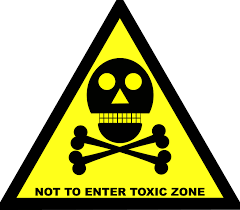Have you ever wondered how to spot a toxic person?
Perhaps you’ve noticed the signs of toxic people already without even realizing it. Do you have a person, or people, in your life that causes you untold worlds of stress? Draining, non-supportive people who bring chaos in to your world? These people can be quite difficult to deal with because they defy logic. They are blissfully unaware of the negative impact they have on others.
Toxic people create unnecessary complexity, strife, chaos, and worst of all – stress. Stress can have a long lasting and negative impact on the brain, emotional and physical health, and not to mention on your relationships, too. Read more about how stress affects your relationships here.
Recent research from the Department of Biological and Clinical Psychology at Friederich Schiller University in Germany found that when you expose a subject’s brain to stimuli that causes strong negative emotions it caused the subjects’ brains to have a massive stress response – such as the same kind of response you have when dealing with toxic people.
Conclusion – toxic people create a stress response in your brain that should be avoided at all costs.
Signs of a Toxic Person
Pessimists. They spread negativity everywhere. Example: A work colleague that constantly complains without offering a solution.
Drama! No matter who they are with or where they go the drama follows them everywhere. Once you solve one problem another one crops up. And all problems, whether big or small, are catastrophic in nature. All problems require maximum coddling from others. Oh and woe betide anyone who tries to offer a solution…..
They have a problem for every solution!
Someone who cheerfully upsets those around them while they seem quite happy to have done so.
Complainers and Blamers. They turn things around so that the wrong they have done is suddenly YOUR fault and not theirs.
Energy suckers. You spend a lot of time and emotional strength trying to cheer them up.
They force relationships upon you. Often you’ll notice that a toxic person will exaggerate an existing relationship or force feelings. Let’s say they make a positive connection with someone – suddenly this person is their soul mate or their BFF. You’ll find evidence of the relationship everywhere because it validates them. You know that girl you just met last night at your friend’s dinner party, the one you had a superficial 10 minute conversation with about red wine? Yeah, her. She changed her Facebook status to “In a relationship” and is currently looking on Pinterest for wedding ideas. See what I mean?
They talk more than they listen. Toxic individuals often have narcissistic tendencies so they are more comfortable talking about themselves rather than listening to you.
Liars – self explanatory, right? Compulsive liars benefit in some way from their lies, always. They will often lie when it’s easier to tell the truth.
Controlling behavior. Toxic individuals like to control the conversation, their environment, and even their partners. They will exert pressure upon you or require you act or feel a certain way. And sometimes they withhold something you need, like love, in order to force you to fall in line with their control.
Gossip. Toxic people love to talk about others because it brings them down while elevating the toxic person’s image. This demonstrates the poor self esteem common among toxic individuals.

You know you’ve dealt with a toxic person because after dealing with them you feel mentally and emotionally drained and tired or sad/blue/depressed because you are now the proud owner of all of their negativity and toxicity.
Not all toxic individuals will exhibit all of these signs but if you see someone with more than a couple of these traits you might want to reevaluate your friendship.
JoyWork Suggestion: Journal about these toxic signs and see if anyone in your life is exhibiting this behavior.
Leave me a comment and let me know how you’re doing on the Accelerated JoyWorks Facebook page. You can also let me know if you have a subject you would like me to address in the next article. Feel free to share this article with your friends and family or anyone whom you think might benefit.
